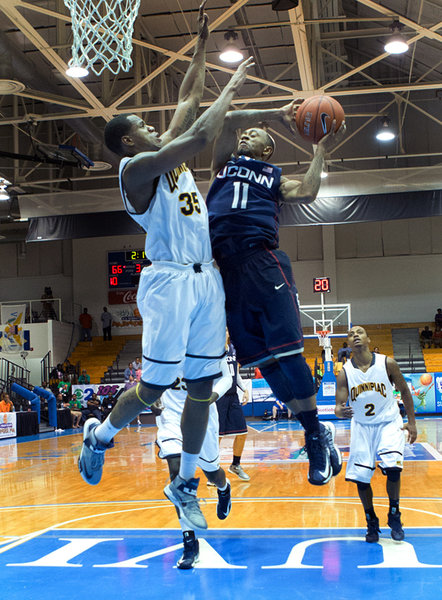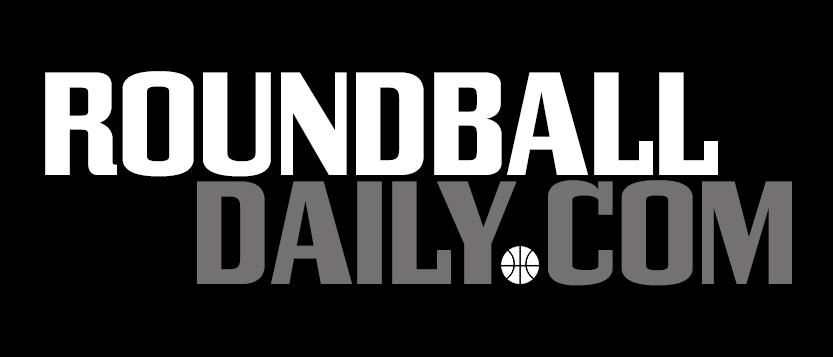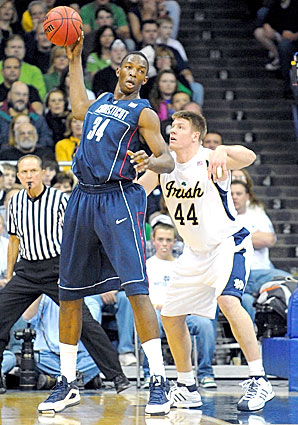- Attacking style not the only reason some Tottenham fans will back Ange Postecoglou until the bitter endPosted 5 months ago
- Paris Olympics takeaways: What did Team USA’s crunch-time lineup say about NBA’s hierarchy?Posted 10 months ago
- Zach Edey posted an easy double-double in Summer League debut. Here’s why he’ll succeed in NBAPosted 12 months ago
- What will we most remember these champion Boston Celtics for?Posted 12 months ago
- After long, seven-year road filled with excruciating losses, Celtics’ coast to NBA title felt ‘surreal’Posted 12 months ago
- South Florida men’s basketball is on an unbelievable heater– but also still on the bubblePosted 1 year ago
- Kobe Bufkin is balling out for Atlanta Hawks’ G League team. When will he be called up to NBA?Posted 1 year ago
- Former Knicks guards Immanuel Quickley, RJ Barrett may yet prove Raptors won the OG Anunoby tradePosted 1 year ago
- Rebounding savant Oscar Tshiebwe finally gets NBA chance he’s deserved for yearsPosted 2 years ago
- Is Tyrese Maxey vs. Tyrese Haliburton the next great NBA guard rivalry?Posted 2 years ago
Big-time basketball shrinks through the prism of Quinnipiac-UConn
- Updated: November 19, 2012
By: Kels Dayton
It’s Tuesday night at Side Street Bar and Grille in Hamden. Like most Tuesdays, the place is packed with hungry Quinnipiac students, here for a night’s worth of camaraderie and free buffalo wings.
Every table in the dining room is filled, with individual cliques claiming their territory. It’s a scene from a high school cafeteria, only with dimmer lights, several mounted TV’s tuned to various sporting events, and $2.50 drafts.
In the middle of it all is Steve Robinson, a senior guard on the Quinnipiac men’s basketball team and one of the most outgoing, gregarious people at the bar. Quinnipiac is a small enough school that Robinson can be at once, Steve from sociology class, and Steve Robinson, basketball player on the best team in school history. It’s March 2010, and the Bobcats are 21-8, rolling towards their first Northeast Conference regular season title in school history.
Friends surround him at the table, talking about basketball and girls and everything else. In a few days, Robinson will be on the court during the win-or-go-home NEC Tournament. The season will end on a last-second shot by Robert Morris’ Velton Jones. Everyone will gather around Robinson the following Tuesday, offering condolences, reminiscing on the good times, and drowning their sorrows in free fried chicken and Shock Tops.

UConn needed double overtime to take down Quinnipiac on Sunday night. (Photo Courtesy: Thomas Laer/Hartford Courant)
If there’s one thing about my college experience that I miss most, it might be those Tuesday nights when the weather was starting to warm, school was coming to an end and the Bobcats had a shot at reaching the NCAA Tournament.
It wasn’t like the school was crazy with basketball fever, the way UConn, Duke, or even Butler is. But there were enough of us who cared that Quinnipiac had a shot at the NCAAs, enough of us who desperately wanted to feel what it would be like to see our school on the national stage, even if just for a couple of hours, getting blown out by Michigan State or Kentucky.
I came to Quinnipiac because of its communications program, because I wanted to stay close to home, and perhaps most importantly, because it had a Division I men’s basketball team. Sure, the Bobcats play in one of the worst basketball conferences in Division I (the Northeast Conference is 3-31 all-time in the NCAA Tournament, and all three of those wins have come in preliminary round games against fellow bottom feeders.) But as long as I had a chance of finding my school’s name on the NCAA Tournament bracket, the holy grail of college basketball, I was okay.
Sure, I knew that, in the college basketball world, QU was a virtual nobody. I knew that I’d be lucky if I got to see them play in one NCAA game in the next decade. But I wanted to go to QU because I wanted to chase that impossible dream.
One day, we would reach the NCAA Tournament.
One day, we would make a Cinderella run, knock off a big-time program and become a national darling. One day, all of the CIT appearances and February losses to Saint Francis (NY or PA) would pay off. I would extract some greater cosmic meaning from the day when Quinnipiac made the NCAA Tournament because it would be my school. The place I sat in biology class, the place I invested four years of my life.
In the past few years, Quinnipiac has come closer to the Big Dance than ever before. They have advanced to the Northeast Conference semifinals five times since 2007. They’ve built a beautiful arena on top of a hill, the clear-cut class of the NEC and a tremendous recruiting tool. They’ve hired an excellent coach with a championship pedigree, brought in better talent and risen from the bottom of the NEC to the top, having won the conference’s regular season title and hosted the conference championship game on ESPN in 2010.
Last night, Quinnipiac took UConn to double overtime in the semifinals of the Paradise Jam in the Virgin Islands. It was only a preseason tournament, but that game, those two hours, were exactly what I had always hoped for. What I had imagined when I chose QU. Growing up in Connecticut, I’ve always been a huge UConn fan. I love the Huskies because they are our state’s team, and no one in the state was more excited when UConn toppled the rest of the college basketball world and won the national title—first in 1999, then in 2004, then in 2011.
 But as the Bobcats took the court last night, I didn’t even think twice about which team I was rooting for. I feel a connection to my school’s basketball team the way I feel a connection with my relatives. It’s not even something I have to think about. UConn might as well have been North Carolina, Florida, or Southeast Missouri State. For one of the few times in my life, I was actively rooting against them, genuinely upset when Shabazz Napier went off in the second half. As the CBS Sports Network cameras panned the stands and showed dozens of stunned UConn fans, glancing over at their little sister school from the south, taking them to the woodshed, I was elated. It was strange to not be on their side.
But as the Bobcats took the court last night, I didn’t even think twice about which team I was rooting for. I feel a connection to my school’s basketball team the way I feel a connection with my relatives. It’s not even something I have to think about. UConn might as well have been North Carolina, Florida, or Southeast Missouri State. For one of the few times in my life, I was actively rooting against them, genuinely upset when Shabazz Napier went off in the second half. As the CBS Sports Network cameras panned the stands and showed dozens of stunned UConn fans, glancing over at their little sister school from the south, taking them to the woodshed, I was elated. It was strange to not be on their side.
The Bobcats blew a ten-point lead with 4 minutes to play, and despite some heroics in overtime, fell in double OT.
My roommate called me after the game, and we talked about how incredible it was to have had that moment. We talked about the probability of Quinnipiac winning the national title in our lifetime, and we both agreed that if it did happen, 70 years from now, we’d be okay with dying immediately after.
_ _ _ _ _ _ _ _ _ _ _ _ _ _ _
I once met Hasheem Thabeet at a party in Storrs. It was Spring Weekend, the craziest time of the year at UConn, when the students absolutely lose their minds for two days before the cramming for final exams begins. Hasheem was hanging out, all 7-2 of him, towering over his peers like Gulliver in the Land of the Lilliputians. There were 30 or 40 of them surrounding him in a circle, like a hurricane of people surrounding its eye, moving as he did, posing for pictures and clamoring for their chance to speak with the gentle giant.
I always thought that this scene perfectly encapsulated the strange dichotomy of college sports. The hopes and dreams of an entire fan base, an entire state, rested on this 19-year old kid from Tanzania, whose only true gift was that he was born a giant, albeit one with excellent hand-eye coordination.
This isn’t the NBA, where professionals get paid millions of dollars to entertain fans by trying their best on the basketball court, succeeding and sometimes failing, in the white-hot spotlight of sold-out arenas, ESPN cameras, and now, anyone with Twitter or a smart phone.
This is school. This is college. A place where students come to find their passion, discover a career path, and eventually, develop into professionals who deserve to be scrutinized based on their performance because they are being paid to do so.
There’s something strange about turning on ESPN and seeing so much energy being invested in these kids. So much scrutiny, so much analysis, so much everything. In the end, like everything else, it all revolves around money, and there’s an audience of millions who are enthralled with college sports. So CBS pays billions for the rights to broadcast the NCAA Tournament. College presidents seek out the conferences that will provide them with the best television deals, and the whole thing spirals out of control. Everyone in college athletics is getting rich except for the athletes, without whom there is no industry.
And we wonder why some of these kids skip classes. Why most of them believe they will get to the NBA if they just work hard enough, and why so many of them end up basketball vagabonds, bouncing around from Israel to China to your local YMCA.
Maybe I would feel differently if I had gone to UConn. Maybe having a front-row seat to big-time college athletics would have helped me understand it, digest it for what it is and move on.
But for those of us who went to small schools, things are different. I can’t wrap my head around conference realignment, BCS B-S, or a pack of reporters relying solely on the whims of an 18 year old kid to do their jobs.
Maybe it does have something to do with the fact that Quinnipiac will never be UConn—they’ll probably never figure into the national title picture or host ESPN’s College Gameday.
But maybe it runs deeper. Maybe it goes back to those Tuesday nights at Side Street, where our big-time athletes were sitting at those cliqued-off tables, gazing up at the college basketball action on ESPN like the rest of us.
Maybe the big-time is best when you only get to experience it once every so often.


Pingback: Big-time basketball shrinks through the prism of Quinnipiac-UConn | JockSpin.com Sports News and Opinion Aggregator and Publisher